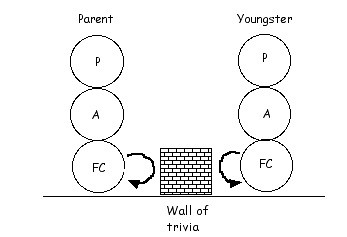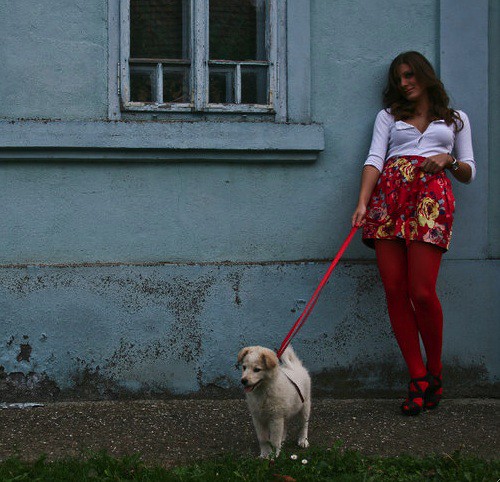This is an associated game of Stupid and is sometimes called the game of Spoilt Child. Here love and money get mixed up. The parents believe they can express their love to a child by giving it things. They may even end up saying to the child, “Of course I love you look at all the things I have given (done) for you”.
The parent is for what ever reason unable to express feelings of love or affection to the child. (Their parents may have done the same to them, they have a “Don’t show your feelings” injunction, they may have their own closeness issues, they may equate affection feelings with sexual feelings and that scares them, they may just be self centred and have little interest in giving affection to the child because they want it themselves, and so on).

So the parents give things instead showing love or affection. A prime example can be boarding school in some instances. “I have sent my daughter to a very expensive boarding school so she gets the best education”, (and by the way it also gets her out of the way so I can go and do all my things).
In this game, over time the child’s bedroom begins to start looking like a shop of “Toys-r-us”. The child gets a never ending series of toys and things with which it can play or be entertained by. Computers, computer games, bikes, flat screen TV, pets, DVD player, CD player, overseas holidays, swimming pool, and so on endlessly. (This is of course encouraged along the way by all the marketing which often portrays the line that if you buy this gift for your child then he/she will feel loved by you.)

The problem with this game is that it half ‘hits the spot’. And that can trick both parties’ Child ego states. They think they are being shown love when in fact they are not. All humans have a need for love. That need can only be fully met when:
It is shown to the person first hand (so not mother telling the child that father loves her)
Is face to face (so not via email or even the phone to some extent)
Has emotion involved
Has some form of physical contact.
If these conditions happen then the Free Child need of the person for love is met and satisfied. Indeed the child will feel loved by its mother or father if the love is expressed to the child in ways like this.


I sometimes hear clients say; “I know my father loved me, even though he never told me that”, or “I used to over hear my father tell others how much he loved me but he never actually told me”. Unfortunately these only half meet that Free Child need for love.
Societies will even formalise times when the Free Child need for love is meant to be met. In our country it is often birthdays, and the birthday gift is meant to be an expression of love for the other person. But the physical gift is only a symbol of that love and to the Free Child that does not mean much.
This is summed up well by Coleman & White (1988), “To clarify this point, consider the example of a parent and child playing a game of cards. We would invite such a parent to consider the following question : Are you playing cards with your child, or are you playing with your child and that just happens to be cards at the moment? Toys, games and play activities can provide an effective way of avoiding contact with a child. They can allow the parent and child to become side-tracked into the activity and avoid closeness, contact or openness with each other. Parents who provide children with expensive toys particularly need to consider how they play with their children.”(P13).

In the wall of trivia ‘things’ get in the way of the two parties actually getting close and having intimacy. The Free Child to Free Child transactions get blocked. Indeed in some marital counselling, the counselling can become a thing that gets in the way as well. It gives both parties a ‘thing’ to talk about other than themselves and their feelings for the other party.
A derivative of the game, “for the love or money” is the game of “Childhood obesity”. In this game love does not get mixed up with an expensive gift but instead love gets mixed up with food. The parent has the mistaken belief that it can express its love to a child by providing it with food and the child begins to take this on and when it feels full it feels loved. So it is provided with lots of food and it eats the food in its desire to feel loved. Again this only half “hits the spot”. For a brief while the Free Child need for love is met when it eats but it does not last because the need is not really getting met in the way I described above. (Note there are many other reasons as well for the over weight child).

The other derivative of the game, “for the love or money” is the game of “Higher, faster, longer”. In this instance love gets mixed up with achievement in the child’s mind. “If I can jump higher, swim faster or run longer then mum will love me”. “If I can win the gold medal then dad will finally notice me” The child believes that if it can achieve success in sport, business, education and so on then the parental love that it craves will finally be given. I would suggest that many high achievers are of this ilk. Again, it works for a little while, and the parents may in fact provide the contact with the child when it does achieve. The problem is there is always another race, there is always more that could be achieved. So the child never gets to the end and often high achievers are left with a hollow feeling as they look at their trophy cabinet, investment portfolio or degrees hanging on the wall.
Graffiti
No comments:
Post a Comment